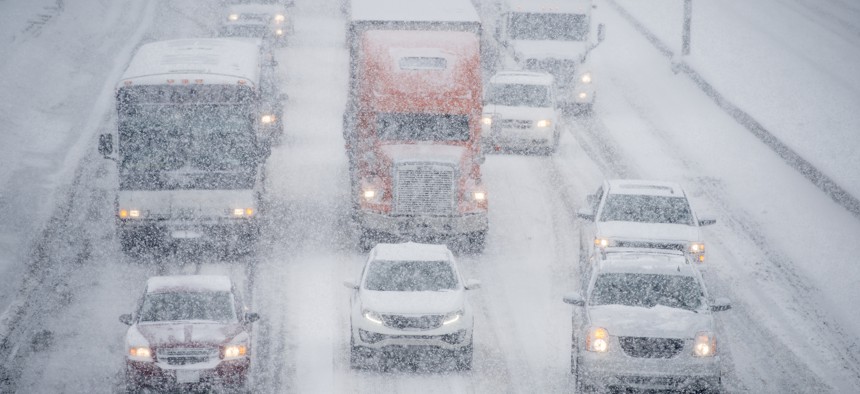How Governments Can Prevent Highway Snow Disasters

iStock.com/FatCamera
Transportation experts recommend ways for averting a weather fiasco like the one that shutdown Interstate 95 in Virginia, trapping thousands of motorists in their vehicles for more than a day.
A Virginia snowstorm that stranded thousands of motorists on an interstate for more than a day this week has raised concerns across the nation about how to prevent similar situations from occurring.
Thousands of motorists—including one U.S. senator—found themselves trapped in their cars in Virginia overnight Monday and throughout the day Tuesday, as snow and ice brought traffic in both directions on Interstate 95 to a standstill for 48 miles. As of Tuesday night, cars were no longer stuck on the highway but some were still stranded on side roads, according to media reports.
Hani S. Mahmassani, director of the Northwestern University Transportation Center, said preplanning with multiple scenarios might be the best course of action instead of reacting to a weather crisis, getting overwhelmed and deciding what to do on the spot.
“In best practice, you are preparing for contingencies and then you monitor all of it in real-time so that you can act very fast to address severe conditions," Mahmassani, a professor of civil and environmental engineering, said. "It seems to me there are just so many questions that one can ask like, 'was this done' or 'why wasn't that done?’
As for this week's highway debacle in Virginia, “If I were to summarize it, it was little done way too late, essentially."
Deploy Resources Quickly
If motorists are stuck in traffic for a significant period due to a massive snowstorm, Mahmassani recommended states and localities take a different, more helpful approach. This includes clearing the roads quickly and promptly with the resources available.
“You don't keep people on the highway, you move them. If the weather conditions are so bad you must deploy whatever it takes to get to the people in one form or another," Mahmassani told Route Fifty. "And that may involve using helicopters and other forms of reaching them."
Mahmassani also suggested deploying military-level capabilities for extreme weather events because that's what people expect as taxpayers—that they will be taken care of in the event of a natural disaster.
"I know that all the police officers and others were working hard to clear out people, but ultimately people were abandoned by the entities that are in charge," he said.
Invest in Operations
In addition to evacuating people, H. Oliver Gao, a professor at Cornell University’s School of Civil and Environmental Engineering, told The Hill decisions about allocating funds for infrastructure improvements will be essential to prevent future situations like the I-95 traffic nightmare.
“How can we make sure we use this money in the correct way, in a long-term systematic way so that we really solve these problems?” Gao told The Hill.
Mahmassani described transportation operations and management as being the "poor child" because a lot of infrastructure money goes to construction. However, these systems are very complex, and he said operations and management are just as important, if not more important, to keep roads and people safe.
Mahmassani said government officials must look at a severe snow event in the same way they do any other big weather event, like flooding.
"There needs to be recognition that operations are a 24/7 kind of activity, not just nine to five," Mahmassani added. "One has to really have in place the ability to deal with emergencies and contingencies of this nature. While they don't happen every day, they do happen."
Andre Claudio is the assistant editor for Route Fifty.
NEXT STORY: At-home Businesses Are Growing. Women and People of Color Benefit the Most





